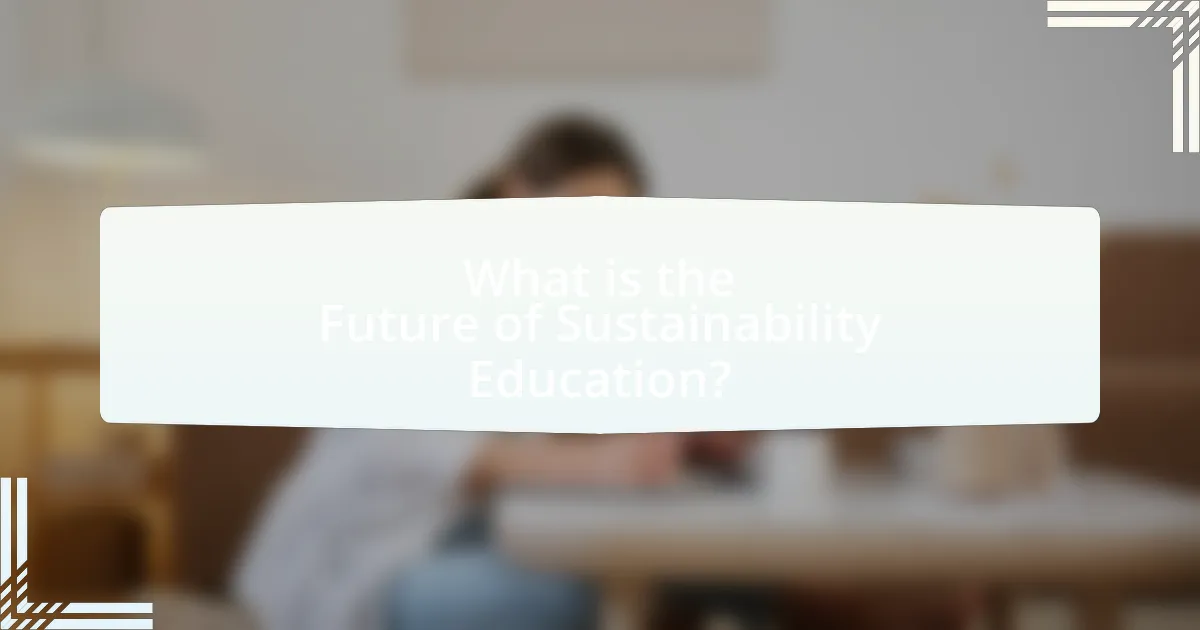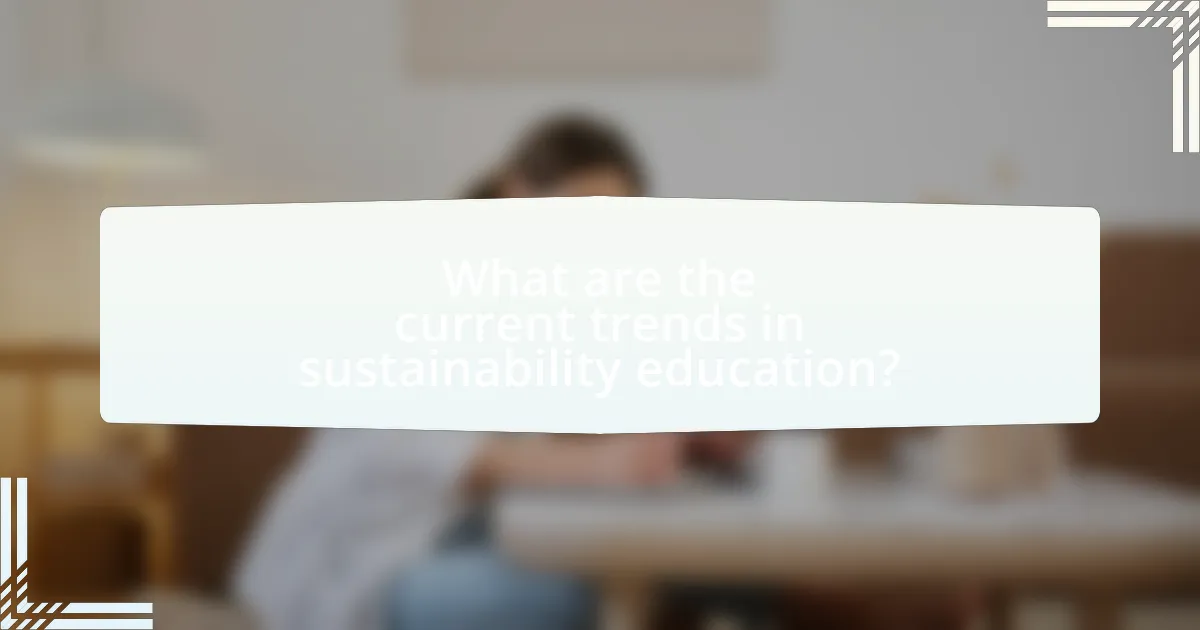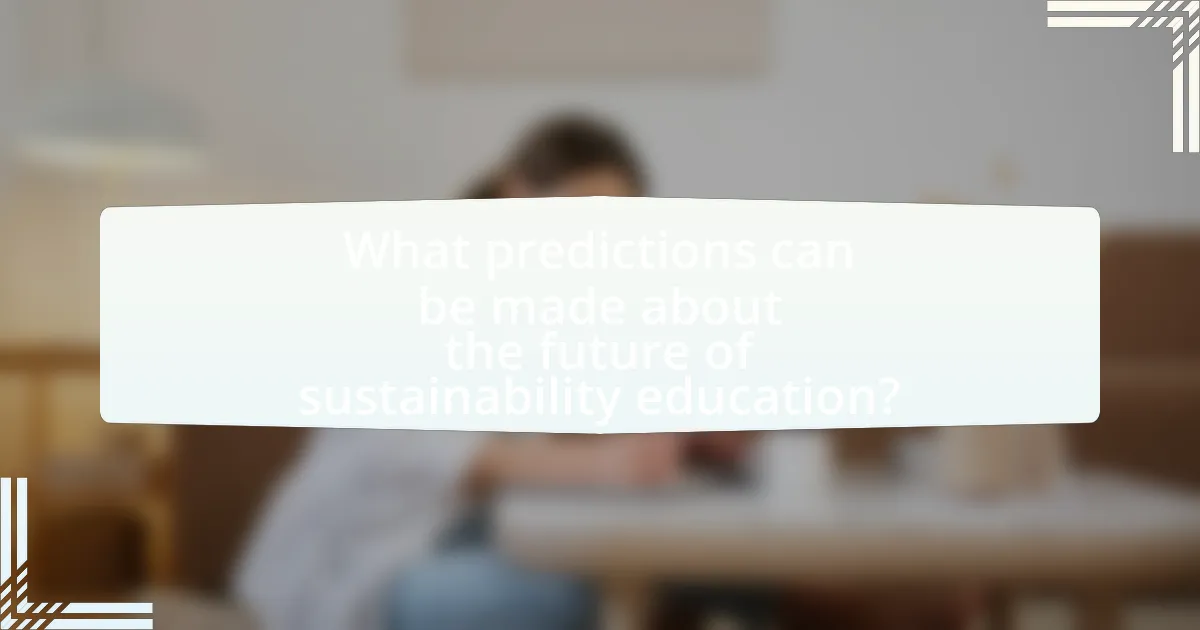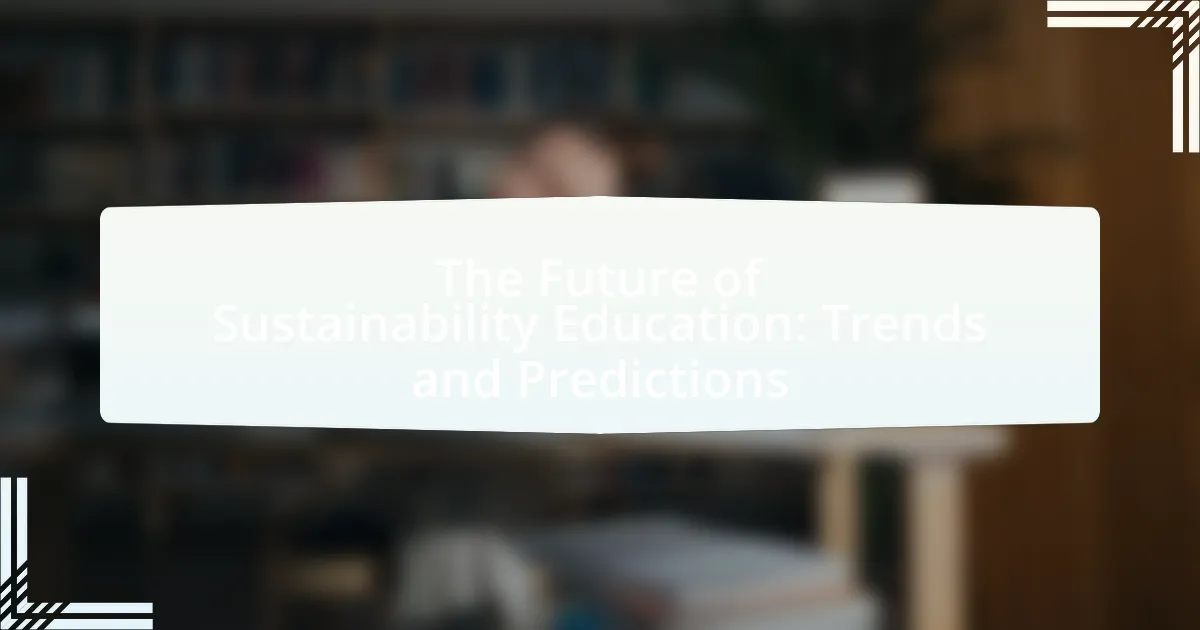The article focuses on the future of sustainability education, highlighting its evolving nature through interdisciplinary approaches, experiential learning, and technological advancements. It discusses the increasing integration of sustainability into educational curricula worldwide, driven by the urgency of climate change and the demand for a skilled workforce. Key trends include the emphasis on real-world problem-solving, the role of online learning, and the importance of partnerships with organizations to enhance educational experiences. The article also addresses the significance of sustainability education in promoting social equity and preparing future generations to tackle environmental challenges effectively.

What is the Future of Sustainability Education?
The future of sustainability education will increasingly integrate interdisciplinary approaches, emphasizing practical applications and real-world problem-solving. Educational institutions are shifting towards experiential learning, where students engage in projects that address local and global sustainability challenges. For instance, a report by the United Nations Educational, Scientific and Cultural Organization (UNESCO) highlights that by 2030, sustainability education will be essential in curricula worldwide, promoting critical thinking and collaboration among students. This trend is supported by the growing demand for a workforce skilled in sustainability practices, as evidenced by a 2021 survey from the World Economic Forum, which found that 85% of employers prioritize sustainability knowledge in hiring.
How is sustainability education evolving in the 21st century?
Sustainability education is evolving in the 21st century through the integration of interdisciplinary approaches, technology, and experiential learning. Educational institutions are increasingly incorporating sustainability into curricula across various disciplines, emphasizing systems thinking and real-world applications. For instance, the United Nations’ Sustainable Development Goals (SDGs) have become a framework for educational programs, guiding institutions to align their teaching with global sustainability challenges. Additionally, advancements in technology, such as online learning platforms and interactive simulations, are enhancing accessibility and engagement in sustainability education. Research indicates that experiential learning, including community projects and internships, significantly improves students’ understanding and commitment to sustainability practices, as highlighted in the 2020 report by the International Journal of Sustainability in Higher Education.
What are the key drivers behind changes in sustainability education?
The key drivers behind changes in sustainability education include increased awareness of climate change, technological advancements, and evolving societal values. Increased awareness of climate change has led educational institutions to integrate sustainability into curricula, reflecting the urgency of environmental issues. Technological advancements, such as online learning platforms and interactive tools, facilitate access to sustainability education, making it more engaging and widespread. Additionally, evolving societal values prioritize sustainability, prompting educational systems to adapt and prepare students for a future that emphasizes environmental responsibility. These factors collectively shape the direction and content of sustainability education, ensuring it remains relevant and impactful.
How do technological advancements influence sustainability education?
Technological advancements significantly enhance sustainability education by providing innovative tools and platforms for learning. These advancements facilitate interactive and immersive experiences, such as virtual reality simulations that allow students to explore ecological systems and the impact of human activities on the environment. For instance, the use of online learning platforms and mobile applications has increased access to sustainability resources, enabling a broader audience to engage with critical environmental issues. Research indicates that integrating technology in education can improve knowledge retention and foster collaborative learning, as evidenced by studies showing that students using digital tools demonstrate higher engagement levels and better understanding of sustainability concepts.
Why is sustainability education important for future generations?
Sustainability education is crucial for future generations because it equips them with the knowledge and skills necessary to address environmental challenges. By understanding concepts such as resource management, ecological balance, and social responsibility, young people can make informed decisions that promote sustainable practices. Research indicates that education in sustainability leads to increased awareness and proactive behaviors regarding climate change, as evidenced by a study published in the Journal of Environmental Education, which found that students exposed to sustainability curricula demonstrated a 30% increase in environmentally friendly behaviors. This foundational knowledge fosters a generation capable of innovating solutions to pressing global issues, ensuring a healthier planet for future inhabitants.
What role does sustainability education play in combating climate change?
Sustainability education plays a crucial role in combating climate change by equipping individuals with the knowledge and skills necessary to understand environmental issues and promote sustainable practices. This education fosters awareness of climate change impacts, encourages critical thinking about resource use, and empowers individuals to take action in their communities. Research indicates that educational programs focused on sustainability can lead to behavioral changes that reduce carbon footprints; for instance, a study published in the Journal of Environmental Education found that students who participated in sustainability education programs were more likely to engage in eco-friendly behaviors, such as recycling and energy conservation. Thus, sustainability education is essential for cultivating a generation capable of addressing climate challenges effectively.
How does sustainability education contribute to social equity?
Sustainability education contributes to social equity by empowering marginalized communities with knowledge and skills necessary for environmental stewardship and economic opportunities. This education fosters awareness of environmental issues that disproportionately affect low-income populations, enabling them to advocate for their rights and access resources. For instance, research by the National Environmental Education Foundation indicates that communities engaged in sustainability education are more likely to participate in decision-making processes, leading to equitable access to green jobs and resources. By integrating social justice principles into sustainability curricula, educational programs can address systemic inequalities, thus promoting a more equitable society.

What are the current trends in sustainability education?
Current trends in sustainability education include an increased emphasis on interdisciplinary approaches, experiential learning, and the integration of technology. Interdisciplinary approaches combine insights from various fields such as environmental science, economics, and social justice, fostering a holistic understanding of sustainability challenges. Experiential learning, through hands-on projects and community engagement, enhances student involvement and practical application of sustainability concepts. Additionally, the use of technology, including online platforms and digital simulations, facilitates access to resources and collaborative learning experiences. These trends are supported by research indicating that such methods improve student engagement and retention of sustainability principles.
How are educational institutions adapting their curricula for sustainability?
Educational institutions are adapting their curricula for sustainability by integrating interdisciplinary approaches that emphasize environmental stewardship, social responsibility, and economic viability. Many universities are now offering specialized programs in sustainability studies, which combine elements from fields such as environmental science, economics, and social sciences to provide a comprehensive understanding of sustainability challenges. For instance, the University of California, Berkeley has developed a Sustainability Studies minor that encourages students to engage in real-world sustainability projects, thereby enhancing practical learning. Additionally, institutions are incorporating sustainability into existing courses across disciplines, ensuring that all students, regardless of their major, understand the importance of sustainable practices. This shift is supported by the growing recognition of the United Nations Sustainable Development Goals, which serve as a framework for educational institutions to align their curricula with global sustainability objectives.
What innovative teaching methods are being implemented?
Innovative teaching methods being implemented in sustainability education include experiential learning, project-based learning, and the integration of technology. Experiential learning allows students to engage directly with real-world sustainability challenges, fostering critical thinking and problem-solving skills. Project-based learning encourages collaboration among students as they work on sustainability projects, enhancing their understanding of complex environmental issues. The integration of technology, such as virtual simulations and online platforms, facilitates access to diverse resources and enables interactive learning experiences. These methods are supported by research indicating that active learning strategies significantly improve student engagement and retention of knowledge in sustainability topics.
How are partnerships with organizations enhancing sustainability education?
Partnerships with organizations are enhancing sustainability education by providing resources, expertise, and real-world applications that enrich learning experiences. For instance, collaborations between educational institutions and environmental NGOs allow students to engage in hands-on projects, such as community clean-ups or conservation efforts, which deepen their understanding of sustainability concepts. Research indicates that students involved in such partnerships demonstrate improved knowledge retention and a greater commitment to sustainable practices, as evidenced by a study published in the Journal of Environmental Education, which found that experiential learning through partnerships significantly increases student engagement and awareness of environmental issues.
What role does online learning play in sustainability education?
Online learning plays a crucial role in sustainability education by providing accessible, flexible, and scalable opportunities for individuals to engage with sustainability concepts. This mode of education allows learners from diverse backgrounds and locations to access high-quality resources and expert knowledge, which is essential for fostering a global understanding of sustainability issues. According to a report by the United Nations Educational, Scientific and Cultural Organization (UNESCO), online learning platforms can reach millions of learners, significantly enhancing the dissemination of sustainability education and promoting lifelong learning.
How has the pandemic accelerated online sustainability education?
The pandemic has significantly accelerated online sustainability education by increasing the demand for remote learning solutions. As educational institutions transitioned to online platforms due to lockdowns, many developed and expanded their sustainability curricula to meet the growing interest in environmental issues. For instance, a report from the United Nations Educational, Scientific and Cultural Organization (UNESCO) highlighted that online courses related to sustainability saw a 200% increase in enrollment during 2020. This shift not only made sustainability education more accessible but also integrated innovative teaching methods, such as interactive webinars and virtual workshops, enhancing engagement and knowledge retention among learners.
What are the benefits and challenges of online sustainability courses?
Online sustainability courses offer the benefit of accessibility, allowing learners from diverse backgrounds to engage with sustainability topics regardless of geographical location. This accessibility is supported by the increasing availability of online platforms, which have seen a 50% rise in enrollment in online courses over the past five years, according to the National Center for Education Statistics.
However, challenges include the potential lack of hands-on experience, which is crucial for understanding practical applications of sustainability concepts. A study by the Journal of Environmental Education found that 70% of students felt that online courses did not provide sufficient real-world engagement opportunities. Additionally, the effectiveness of online learning can be hindered by varying levels of digital literacy among students, which can affect their ability to fully participate in and benefit from the course material.

What predictions can be made about the future of sustainability education?
The future of sustainability education is expected to see increased integration of interdisciplinary approaches, emphasizing collaboration across various fields. This shift is driven by the recognition that sustainability challenges, such as climate change and resource depletion, require diverse perspectives and expertise for effective solutions. According to a report by the United Nations Educational, Scientific and Cultural Organization (UNESCO), educational institutions are increasingly adopting sustainability as a core component of their curricula, with a projected 50% of universities worldwide incorporating sustainability education by 2030. This trend reflects a growing commitment to equipping students with the knowledge and skills necessary to address complex environmental issues.
How will sustainability education evolve in the next decade?
Sustainability education will evolve significantly in the next decade by integrating technology, interdisciplinary approaches, and experiential learning. Educational institutions will increasingly adopt digital platforms and tools, such as virtual reality and online simulations, to enhance engagement and understanding of sustainability concepts. Research indicates that experiential learning, which includes hands-on projects and community involvement, leads to better retention of knowledge and skills related to sustainability (Kolb, 1984). Furthermore, interdisciplinary curricula will become more common, combining environmental science, economics, and social studies to provide a holistic view of sustainability challenges. This evolution is supported by the growing recognition of the need for comprehensive education that prepares students to address complex global issues, as highlighted in the United Nations’ Sustainable Development Goals.
What emerging technologies are likely to shape sustainability education?
Emerging technologies likely to shape sustainability education include artificial intelligence, virtual reality, and blockchain. Artificial intelligence can personalize learning experiences and analyze data to improve educational outcomes, as evidenced by its application in adaptive learning platforms. Virtual reality offers immersive experiences that allow students to engage with environmental issues in a simulated environment, enhancing understanding and empathy. Blockchain technology can provide transparent tracking of sustainability efforts and credentials, ensuring the integrity of educational programs. These technologies collectively enhance engagement, accessibility, and accountability in sustainability education.
How might global policies impact sustainability education trends?
Global policies significantly influence sustainability education trends by establishing frameworks that prioritize environmental issues in educational curricula. For instance, international agreements like the Paris Agreement encourage countries to integrate climate change education into their systems, leading to increased emphasis on sustainability topics in schools and universities. Research indicates that nations adopting such policies often see a rise in programs focused on renewable energy, conservation, and sustainable practices, reflecting a shift in educational priorities. This alignment between policy and education fosters a generation more equipped to tackle sustainability challenges, as evidenced by the growing number of sustainability-focused degree programs worldwide.
What skills will be essential for future sustainability educators?
Future sustainability educators will need strong interdisciplinary knowledge, effective communication skills, and the ability to foster critical thinking. Interdisciplinary knowledge allows educators to integrate concepts from environmental science, social justice, and economics, which is essential for addressing complex sustainability issues. Effective communication skills enable educators to convey complex ideas clearly to diverse audiences, facilitating engagement and understanding. Additionally, fostering critical thinking equips students to analyze problems and develop innovative solutions, which is crucial in a rapidly changing world. These skills are supported by research indicating that interdisciplinary approaches enhance learning outcomes in sustainability education (Wiek et al., 2011, “Key Competencies in Sustainability”).
How can educators prepare for the changing landscape of sustainability education?
Educators can prepare for the changing landscape of sustainability education by integrating interdisciplinary approaches that encompass environmental science, social justice, and economic factors. This preparation involves updating curricula to reflect current sustainability challenges, such as climate change and resource depletion, and incorporating hands-on, experiential learning opportunities that engage students in real-world problem-solving. Research indicates that programs emphasizing project-based learning and community involvement significantly enhance student understanding and commitment to sustainability principles. For instance, a study by the National Environmental Education Foundation found that students participating in outdoor and community-based projects showed a 70% increase in environmental knowledge and a 60% increase in pro-environmental behaviors.
What professional development opportunities are available for sustainability educators?
Professional development opportunities for sustainability educators include workshops, online courses, certification programs, and conferences focused on sustainability practices and pedagogy. These opportunities are often provided by organizations such as the National Council for Science and the Environment, which offers training sessions and resources for educators to enhance their teaching methods in sustainability. Additionally, universities and educational institutions frequently host seminars and webinars that cover the latest trends in sustainability education, allowing educators to stay updated on best practices and innovative approaches.
What practical steps can individuals take to enhance sustainability education?
Individuals can enhance sustainability education by actively participating in community initiatives focused on environmental awareness. Engaging in local clean-up events, tree planting activities, or sustainability workshops allows individuals to learn and share knowledge about ecological practices. Research indicates that hands-on experiences significantly improve understanding and retention of sustainability concepts, as demonstrated by a study published in the Journal of Environmental Education, which found that experiential learning increases student engagement and knowledge retention by up to 75%. Additionally, individuals can utilize online platforms to access courses and resources on sustainability, further broadening their understanding and ability to educate others.
How can educators incorporate real-world sustainability challenges into their teaching?
Educators can incorporate real-world sustainability challenges into their teaching by integrating project-based learning that focuses on local environmental issues. This approach allows students to engage with tangible problems, such as waste management or energy conservation, fostering critical thinking and problem-solving skills. Research indicates that experiential learning significantly enhances student engagement and retention of knowledge, as demonstrated in studies like the one conducted by the National Academy of Sciences, which found that hands-on projects lead to a deeper understanding of complex concepts. By collaborating with local organizations or conducting field studies, educators can provide students with practical experiences that connect classroom learning to real-world applications, thereby preparing them for future sustainability challenges.
What resources are available for those interested in sustainability education?
Numerous resources are available for those interested in sustainability education, including online courses, academic programs, and community initiatives. Online platforms like Coursera and edX offer courses from universities such as Stanford and Yale, focusing on sustainability topics. Academic institutions provide degree programs in environmental science and sustainability studies, equipping students with essential knowledge and skills. Additionally, organizations like the United Nations and local environmental groups offer workshops and resources to promote sustainability awareness and practices. These resources collectively support the growing demand for sustainability education and empower individuals to contribute to environmental stewardship.

Leave a Reply